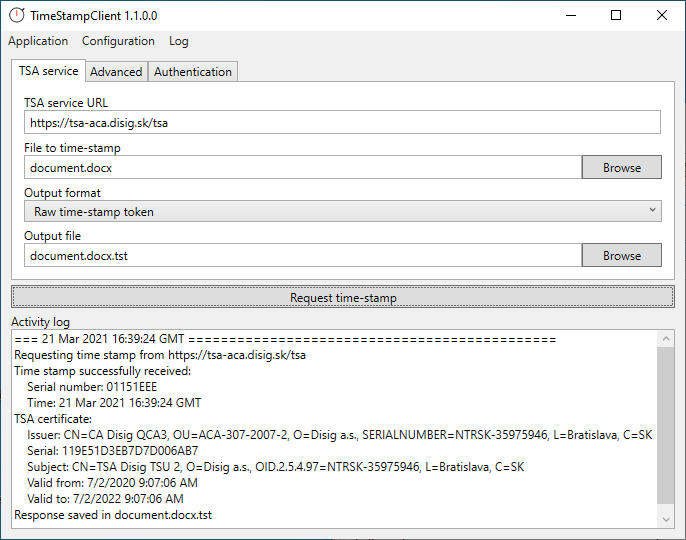Easy to use .NET RFC 3161 time-stamp client library and applications based on Bouncy Castle library.
TimeStampClient:
- runs on Windows, Linux and macOS
- supports Time-Stamp Protocol over HTTP/HTTPS and TCP
- supports SSL authentication (client certificate) and HTTP basic authentication (login and password)
- uses system HTTP proxy settings
- contains GUI application
- contains command line application
- contains reusable .NET library
There are multiple release artifacts available:
TimeStampClient.nupkg- NuGet package with reusable .NET libraryTimeStampClient.snupkg- NuGet package with debug symbols for reusable .NET libraryTimeStampClientCmd.zip- Command line tool usable on Windows, Linux and macOSTimeStampClientGui.Linux.zip- GUI application usable on LinuxTimeStampClientGui.MacOs.zip- GUI application usable on macOSTimeStampClientGui.Windows.zip- GUI application usable on Windows
Official NuGet package is published in nuget.org repository.
In most cases you just need the following single line of code to get a time-stamp.
var timeStampToken = Disig.TimeStampClient.TimeStampClient.RequestTimeStampToken("http://localhost/tsa", "document.docx");.NET 5.0 runtime is required on all platforms in order to use TimeStampClientCmd application.
Getting time-stamp using the command line application on Windows:
> TimeStampClientCmd.exe --tsa http://localhost/tsa --file document.docx --out token.tst
Getting time-stamp using the command line application on Linux and macOS:
$ dotnet ./TimeStampClientCmd.dll --tsa http://localhost/tsa --file document.docx --out token.tst
On Windows:
- Extract
TimeStampClientGui.Windows.ziparchive - Start the application by double-clicking on
TimeStampClientGui.exefile
On Linux:
- Install .NET 5.0 runtime
- Extract
TimeStampClientGui.Linux.ziparchive - Start the application with the following command:
$ dotnet ./TimeStampClientGui.Linux.dll
On macOS:
- Install .NET 5.0 runtime
- Extract
TimeStampClientGui.MacOs.ziparchive - Execute following commands from command line:
$ chmod +x TimeStampClientGui.MacOs.app/Contents/MacOS/TimeStampClientGui.MacOs $ xattr -c TimeStampClientGui.MacOs.app
- Start the application by double-clicking on its icon
User needs to specify the URL of a time-stamping authority in the "TSA service URL" field and the path to a file to be time-stamped in the "File to time-stamp" field. After clicking on the "Request time-stamp" button the time-stamp token is saved to the file specified in the "Output file" field.
TimeStampClient library and applications are available under the terms of the Apache License, Version 2.0.
Human friendly license summary is available at tldrlegal.com but the full license text always prevails.
TimeStampClient library and applications are provided by Disig a.s.
